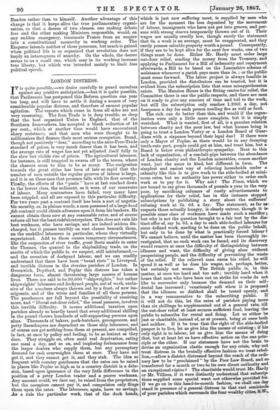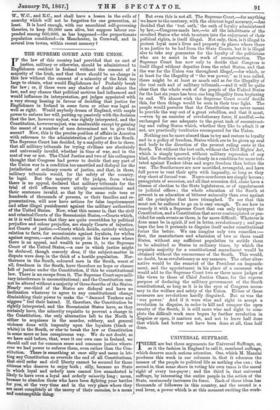LONDON DISTRESS.
TT is quite possible,—we desire carefully to guard ourselves JL against any positive anticipation,—but it is quite possible, that Parliament has postponed this Reform question one year too long, and will have to settle it during a season of very considerable popular distress, and therefore of earnest popular agitation. The reports which come in from all sides are not very reassuring, The Iron Trade is in deep trouble, so deep that the best organized 'Union in England, that of the Southern Ironworkers, has accepted a blank reduction of 10 per cent., which at another time would have encountered sharp resistance, and that men who were thought to be millionaires find finance their most serious occupation. Bread, though not positively "dear," according to the ante-Free-Trade standard of prices, is very much dearer than it has been, and the average rate of wages has not yet adjusted itself fully to the slow but visible rise of prices. The agricultural labourer, for instance, is still tempted to swarm off to the towns, where the chances seem to him to be so many. The emigration towards the great cities has been of late so rapid that the number of men outside the regular grooves of labour is large, and it is on these men that pressure falls with its first severity. Finally, the effects of the "panic " have at last reached down to the lowest class, the sediment, as it were, of our reservoirs of labour. Many contractors have failed, very many have been crippled, and all are exposed to this particular difficulty. For two years past a contract itself has been a sort of negotia- ble security, or, in plainer words, a man possessed of a large bond fide contract could obtain advances upon it from his bankers. He cannot obtain them now at any reasonable rates, and of course refuses all but the leastriskfulenterprises. This does not ruin his best workmen, who have savings, and are indeed seldom dis- charged, but it presses terribly on vast classes beneath them, on the unskilled labourers in particular, whom they virtually superintend. Add to these causes temporary circumstances, like the suspension of river traffic, great fleets unable to enter the Thames, the quarrel in the shipbuilding trade, on the merits of which the public is, we suspect, still misinformed,— and the cessation of dockyard labour, and we can readily understand that there have been "bread riots " in Liverpool, and terrible distress in the riverine parishes of London. In Greenwich, Deptford, and Poplar this distress has taken a dangerous form, almost threatening large masses of human lives. There are said to be 30,000 "shipwrights," but rather shipwrights' labourers and dockyard people, out of work, exclu- sive of the numbers always thrown out by a frost, of new im- migrants, and of the wives and families of all these persons. The poorhouses are full beyond the possibility of receiving more, and " liberal out-door relief," the usual panacea, involves this terrible difficulty. It means additional taxation upon parishes already so heavily taxed that every additional shilling in the pound throws hundreds of self-supporting persons upon alms. Thousands of bakers, pork-butchers, greengrocers, and petty linendrapers are dependent on these ship labourers, and of course can get nothing from them at present, are compelled, in fact, at once by policy and feeling, to be as lenient as they dare. They struggle on, often amid real deprivation, eating one meal a day, and so on, and imploring forbearance from the larger dealers who supply them, but any peremptory demand for cash overweights them at once. They have not got it, and they cannot get it, and they sink. The idea so frequent with country gentlemen that the rates can be raised in places like Poplar as high as in a country district is a delu- sion, based upon ignorance of the very little difference in the position of a petty London trader and a poorer workman. Any amount could, we dare say, be raised from the proprietors, but the occupiers cannot pay it, and compulsion only flings them upon the rates. The labourers, again, have no savings. As a rule the particular work, that of the dock hands, which is just now suffering most, is supplied by- men who k are for the moment the lees deposited by the movement of labour, immigrants who have not got into groove, and per- sons with strong sinews temporarily thrown out of it. Their wages are usually cruelly low, though surely the statement that 6s. a week is an average, must be exaggerated, and they rarely possess saleable property worth a pound. Consequently, if they are to be kept alive for the next few weeks, one of two• things must be done. Either Mr. Hardy must order largo• ont-door relief, sending the money from the Treasury, and applying to Parliament for a Bill of indemnity and repayment afterwards, a Bill to be based on the Lancashire scheme of assistance whenever a parish pays more than 5s. ; or the public must come forward. The latter project is always feasible in London, provided the distributors can be trusted, but it is evident from the subscription lists that some misapprehension exists. The Mansion House is the fitting centre for relief, the- Committee there is one the public respects, and there are men_ on it ready to give any amount of time and toil to the work,. but still the subscription only reaches 1,2001. a day, not- fourpence a day for each person needing fire as well as food.
The rich can do better than this, and would if the organ- ization were only a little more complete, but it is simply wretched. What is wanted, first of all, is a genuine relation between charity and the poor law, but what human being is- going to trust a London Vestry or a London Board of Guar- dians with a sixpence beyond their legal due? If there were only a Mayor of Poplar, as there would be in any decaying tenth-rate port, people could get at him, and trust him, but a Board is below even philanthropic sympathy. Next to this lack of organization, of a conduit-pipe between the abundance- of London charity and the London miserables, comes another want, just the same in kind, but different in form. The simplest and easiest way of relieving households under a. calamity like this is to give work to the able-bodied at mini- mum rates, but no authority has power either to order such work or to pay for it. Why not The Times, which we- are bound to say gives thousands of pounds a year to the very poor, by sacrificing columns of costly advertisements to- applications for their relief, has in this instance stopped subscriptions by publishing a story about the sufferers' refusing work at 6s. 6d. a day. The statement, as far ae... respects those actually hungry, is clearly untrue, though it is, possible some class of workmen have made such a sacrifice but why is not the question brought to a fair test by the die tinct offer of, say ls. 6d. a day to each able-bodied labourer for some defined work, needing to be done on the public behalf, but only to be done by what is practically forced labour ? We cannot believe, until the matter has been thoroughly in- vestigated, that no such work can be found, and its discovery would remove at once the difficulty of distinguishing between idleness and want, the difficulty of giving alms without pauperizing people, and the difficulty of preventing the waste- of the relief. If the relieved man earns his relief, he will spend it as well as he does his wages, not, perhaps, better, but certainly not worse. The British public is, in this matter, at once too hard and too soft ; terribly hard when it hears that men who have been out on strike for weeks do not like to surrender only because the demand on their self-- denial has increased ; vexatiously soft when it is proposed that the idleness so disliked shall be tested openly, and in a way remunerative to the subscribing public. If it will not do this, let the rates of parishes paying more than six shillings be supplemented out of a general rate, till the out-door relief at least secures sufficient food, leaving the public to subscribe for rental and firing. Let us either be just or charitable, instead of, as at present, being at once both and neither. If it be true that the right of the able-bodied pauper is to live, let us give him the means of existing ; if his only right is to labour, let us give him the means of doing that, but at least let us have effective action on the one prin- ciple or the other. If our statesmen have not the brain to devise an organization elastic enough for any crisis, why not treat distress in the brutally effective fashion we treat rebel- lion,—allow a district distressed beyond the reach of the ordi- nary law to be "proclaimed " by the Poor Law Board, and so- transferred for a month or two to its own direct authority and an exceptional regime ? The charitable would trust Mr. Hardy or Mr. Villiers, if it were distinctly understood that subscrip- tions supplied some special want not otherwise provided for. If we go on in this hand-to-month fashion, we shall one day stand in presence of a general distress in that vast semicircle of poor parishes which surrounds the four wealthy cities, S.W., W., W.C., and E.C., and shall have a lesson in the evils of anarchy which will not be forgotten for one generation, at least. It is hard enough, with our anarchical self-governing theories, to keep 30,000 men alive, but suppose labour sus- pended among 600,000, as has happened—the proportionate population considered—in Manchester, in Cornwall, and in several iron towns, within recent memory ?































 Previous page
Previous page